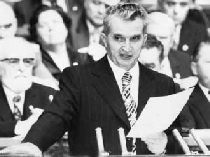Diplomatic Relations Between Romania and the FRG
WWII split Germany in two, the Federal Republic of Germany and the Democratic Republic of Germany.

Steliu Lambru, 18.06.2018, 13:59
WWII split Germany in two, the Federal Republic of Germany and the Democratic Republic of Germany. The west German state refused to recognize the communist state, and relations between the two states fell into an economic and propaganda competition after 1961, symbolized by the Berlin Wall. Placed within opposing military and economic models of development, Romania and FRG initiated relations in the early 1960s. A very important moment in the relationship occurred when West German deputy chancellor Willy Brandt visited Romania in 1967.
In the second half of the 1960s, international relations were changing, and the borders between the capitalist and communist blocs became less rigid. Either country competed for economic profit and tried to open up towards areas of geopolitical interest. Romania, given its tradition of good ties with Germany, was the first communist bloc country to have diplomatic ties with the FRG.
Romania broke the ice in 1967, receiving in Bucharest Deputy Chancellor Willy Brandt, future head of the German government. Diplomat Vasile Sandru, a Deputy Foreign Minister at the time, recalled the preparations for the visit in an interview with Radio Romanias Oral History Center: “This action taken in foreign policy by Romania was a manifestation of the countrys attempt to assert its independence. The context was as follows: in the summer of 1966, Bucharest hosted the meeting of the Warsaw Pact Political Consultative Committee. The concluding document of the conference introduced the idea of calling a European conference for cooperation and security to normalize relations with both German states. In the spirit of this document, Romania set up diplomatic relations with the FRG on its own account, without consulting the allies. Of course this angered the USSR, in addition to the other Warsaw Pact countries.”
The new leader in Bucharest, Nicolae Ceausescu, who came to power in 1965, was perceived by the people and by the West as a less dogmatic communist. He started the opening to the West. Here is Vasile Sandru once again: “Setting up diplomatic relations occurred during a visit to Bonn by Foreign Minister Corneliu Manescu, a visit that stirred a lot of interest in the foreign media, especially given the antagonism it caused on the part of the Soviet Union. A German newspaper published a cartoon which depicted Corneliu Manescu and Willy Brandt in a boat on a lake, being shot at from the shore with all sorts of weapons by people who symbolized both the Warsaw Pact and the more radical circles in the FRG.”
Brandts visit was a sign that diplomatic relations were thawing, and it was also hope for a new era of diplomatic relations. Vasile Sandru: “Willy Brandt came after a first round of talks with Foreign Minister Corneliu Manescu. Then he was received by Prime Minister Gheorghe Maurer. They talked politics, but mostly economic relations between Romania and the FRG. Then Willy Brandt went to the Romanian seaside, where he was received by Nicolae Ceausescu, and they spoke for about five hours. This discussion was mostly politics in Europe, as far as my better informed colleagues told me, and also relations between Socialist parties.”
The German politicians visit also had a personal side, and the Romanians proved to be good hosts : “In terms of how Willy Brandt saw this visit, he came here with his wife and his son Larson, who then took part in leftist movements in Germany. So he took this visit not only politically, but also personally, wanting to get closer to our country. Mrs. Brandt and her son had a separate schedule at the seaside, a very engaging one. They liked the visit a lot. They had the opportunity to see folklore shows and visit culture venues. The visit was meant for them to get to know Romania better. It has to be said that Romania, at the moment it established relations with the FRG, did nothing to damage relations with the Democratic Republic of Germany, in order to foster no criticism in terms of favoring one side or another. Romania was fair in the way it treated relations with both German states.”
Afterward, economic relations between Romania and the FRG went on an upward trend. However, in the 1980s they deteriorated quickly, against the crisis of communism, proving it could not have fair relations with states for which the observance of human rights was important.






























